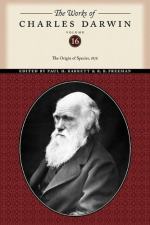CHAPTER 11. GEOGRAPHICAL DISTRIBUTION.
Present distribution cannot be accounted for by differences
in
physical conditions.
Importance of barriers.
Affinity of the productions of the same continent.
Centres of creation.
Means of dispersal, by changes of climate and of the
level of the
land, and by occasional means.
Dispersal during the Glacial period co-extensive with
the world.
CHAPTER 12. GEOGRAPHICAL DISTRIBUTION—continued.
Distribution of fresh-water productions.
On the inhabitants of oceanic islands.
Absence of Batrachians and of terrestrial Mammals.
On the relation of the inhabitants of islands to those
of the nearest
mainland.
On colonisation from the nearest source with subsequent
modification.
Summary of the last and present chapters.
Chapter 13. Mutual affinities
of organic beings: Morphology:
Embryology: Rudimentary
organs.
Classification, groups subordinate to groups.
Natural system.
Rules and difficulties in classification, explained
on the theory of
descent with modification.
Classification of varieties.
Descent always used in classification.
Analogical or adaptive characters.
Affinities, general, complex and radiating.
Extinction separates and defines groups.
Morphology, between members of the same class,
between parts of the
same individual.
Embryology, laws of, explained by variations
not supervening at an
early age, and being inherited at a corresponding
age.
Rudimentary organs; their origin explained.
Summary.
CHAPTER 14. RECAPITULATION AND CONCLUSION.
Recapitulation of the difficulties on the theory of
Natural Selection.
Recapitulation of the general and special circumstances
in its favour.
Causes of the general belief in the immutability of
species.
How far the theory of natural selection may be extended.
Effects of its adoption on the study of Natural history.
Concluding remarks.
ON THE ORIGIN OF SPECIES.
INTRODUCTION.
When on board H.M.S. ‘Beagle,’ as naturalist, I was much struck with certain facts in the distribution of the inhabitants of South America, and in the geological relations of the present to the past inhabitants of that continent. These facts seemed to me to throw some light on the origin of species—that mystery of mysteries, as it has been called by one of our greatest philosophers. On my return home, it occurred to me, in 1837, that something might perhaps be made out on this question by patiently accumulating and reflecting on all sorts




